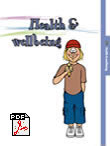- TOOL KITS
- A. The NEXT Step
- B. Promoting Independence
- C. Phone Apps
- D. Return to Work
- E. Motivational Interviewing
- F. Paediatric Brain Injury Rehabilitation Resources
- a) Introduction
- 0. Introduction
- 1. Transition
- 2. The transition wheel
- 3. Walking around the transition wheel
- 4. The transition wheel interview
- 5 . Using this kit
- 6 . Web resources
- b) Working together
- 7. My role
- 8 . My family's role
- 9. My case manager's role
- c) What can I do?
- 10. Who, where, what? The Services I receive
- 11. Accommodation
- 12. Driving
- 13.Alcohol and drugs
- 14. Social and recreational activities
- 15. Health and well-being
- 16. Relationships and friendships
- 17. Sexuality
- 18. Personal safety
- 19. Complaints/rights
- 20. Legal issues
- 21. Centrelink
- 22. Financial
- 23. Shopping
- 24. Employment, training and tertiary education
15. Health and wellbeing
It is always important to look after yourself but this is something that we can forget to do. It is especially easy to forget when you have lots of other things on your mind. When you are going through the move to adult services there are many things to think about and one of these should be about looking after yourself.
Some of the other information sheets have covered topics that are very important to your health. The social and recreational activities information sheet talked about the importance of including these activities into what you do each week. It is also important for some of your activities to include physical activity or exercise. If you do not get enough exercise or if you are bored you could start to feel tired, as well as put on weight!
Another important part of staying healthy is to eat healthy food. Food is your energy. It is what keeps your body working properly. If you do not eat the right food it is very hard for your body to work to its full potential. Make sure that your shopping list and menu includes lots of good food.
There are many things that can harm your health. Cigarettes and alcohol are examples of this. Although these are legal they do cause damage to some of the organs in your body. Non-prescription drugs are illegal but can be easy to get a hold of. All drugs work on your body in different ways. Because they are illegal the manufacturing of them is not controlled so you have no way of knowing exactly what is in the drug and how it will affect you. (Have a look at the Information Sheet on alcohol and drugs).
Many people forget to look after their mind, or their psychological health. By this we mean looking after your emotions and feelings. When changes are occurring our emotions are affected. Change can often make people nervous, it can be scary and upsetting. All these feelings are very appropriate. It is important to acknowledge that you will have different emotional reactions to most things in your life. Sometimes when things are going bad some people worry that their reactions are not normal, that things may never get better or that they are ‘losing it’. If you are concerned about how you are reacting to things it is best to speak to someone about it. Just worrying can make you feel worse. Try speaking with a friend, your case manager, your social worker or a counsellor. You may be surprised that you are reacting appropriately to a difficult situation.
Everyone needs to have a local doctor (also called a G.P.). A local doctor is someone who you can talk with if you are worried about something. A good local doctor is someone that you feel comfortable talking to, knowing that they will be listening to what you are saying. It is helpful to have a local doctor lined up before you get sick and really need them. If you are moving to a different area or do not have a local doctor, it is important that you find one as soon as possible. Try asking your family, friends or neighbours to see if they can recommend a good local doctor. Your doctor should be told about your brain injury so that they can keep this in mind when they are trying to work out how to help you. Sometimes what you think is not important may be important information for your doctor.
If you want to talk with someone about your health contact:
- The Brain Injury Rehabilitation Unit
- Your local doctor
- Your local Community Health Centre (telephone number in the White Pages)
If you want information on specific brain injury health issues
-
Look at the Children’s Hospital, Westmead’s Brain Injury Rehabilitation Web site
Other useful tools
Use Toolkit B Promoting Independence. See especially Section 25 Health and wellbeing


